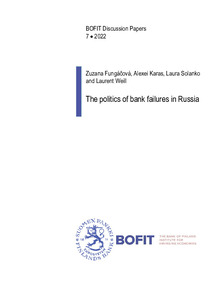The politics of bank failures in Russia
Fungáčová, Zuzana; Karas, Alexei; Solanko, Laura; Weill, Laurent (13.09.2022)
Numero
7/2022Julkaisija
Bank of Finland
2022
Julkaisun pysyvä osoite on
https://urn.fi/URN:NBN:fi:bof-202209131374Tiivistelmä
Russia has witnessed a high number of bank failures over the last two decades. Using monthly data for 2002-2020, spanning four election cycles, we test the hypothesis that bank failures are less likely before presidential elections. We find that bank failures are less likely to occur in the twelve months leading up to an election. However, we do not observe election cycles in bank failures are more pronounced for banks associated with greater political costs. Overall, our results provide mixed evidence that political cycles matter for the occurrence of bank failures in Russia.
Julkaisuhuomautus
FOCUS
A growing literature suggests that politicians have incentives to interfere with the banking system to pursue their own interests. The experience of Russia with high number of bank failures over the past two decades provides a suitable setting for better understanding the interface of politics and bank failures. This paper examines the existence of political cycles in bank failures in Russia. We ask whether the probability of bank failure around major national elections differs from the probability of bank failure otherwise.
CONTRIBUTION
Unlike previous studies relying on yearly data, we use monthly data on individual banks for the period 2002–2020. This enables us to identify the interplay between bank failures and elections over four presidential elections in Russia. Monthly data helps us precisely track the evolution of bank failures around the dates of these elections. Moreover, we extend the literature on bank failures in Russia by asking whether, in addition to economic determinants of failures, political factors might also play a role in this process.
FINDINGS
We show that the probability of a bank failure in Russia is lower in the twelve months leading up to an election. The effect is economically significant with a probability of a bank failure two to three times lower in the pre-election months than at other times. However, we do not observe election cycles in bank failures are more pronounced for banks associated with greater political costs.
A growing literature suggests that politicians have incentives to interfere with the banking system to pursue their own interests. The experience of Russia with high number of bank failures over the past two decades provides a suitable setting for better understanding the interface of politics and bank failures. This paper examines the existence of political cycles in bank failures in Russia. We ask whether the probability of bank failure around major national elections differs from the probability of bank failure otherwise.
CONTRIBUTION
Unlike previous studies relying on yearly data, we use monthly data on individual banks for the period 2002–2020. This enables us to identify the interplay between bank failures and elections over four presidential elections in Russia. Monthly data helps us precisely track the evolution of bank failures around the dates of these elections. Moreover, we extend the literature on bank failures in Russia by asking whether, in addition to economic determinants of failures, political factors might also play a role in this process.
FINDINGS
We show that the probability of a bank failure in Russia is lower in the twelve months leading up to an election. The effect is economically significant with a probability of a bank failure two to three times lower in the pre-election months than at other times. However, we do not observe election cycles in bank failures are more pronounced for banks associated with greater political costs.
Online First: Post-Soviet Affairs 19.5.2023
